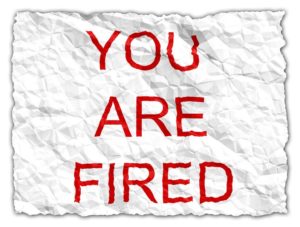
Court Expands Tort of Retaliatory Discharge
Sharp Thinking
Thinking
No. 50 Perspectives on Developments in the Law from The Sharp Law Firm, P.C. August 2011
Court Expands Tort of Retaliatory Discharge
By Sara Crews, sara@lotsharp.com, 618-242-0246[1]
In the 30 years since the Illinois Supreme Court first recognized an action for retaliatory discharge (Palmateer v. Int’l Harvester Co., 85 Ill.2d 124 (1981), that tort has had a checkered past.
Though many recent decisions have tended to restrict the tort, a decision last month from the Illinois Appellate Court’s Fifth District goes against that trend and may provide support for further expansion of the doctrine.

Crews
In Michael v. Precision Alliance Group, LLC, 2011 IL App (5th) 100089,[2] plaintiffs alleged that they participated, or defendant believed they participated, in activity which led the State to conduct a surprise investigation of defendant’s practices in weighing and reporting weights of soybean seed. Plaintiffs further alleged as a result of that real or perceived participation, defendant discharged them from employment. The trial court granted summary judgment for defendant but the appeals panel reversed because “Plaintiffs testified to a sequence of events and interactions with the management of defendant sufficient to raise genuine issues of fact”. The Appellate Court went out of its way to provide an analysis of requirements for a retaliatory discharge claim, in addition to setting forth why there were genuine issues of material fact precluding summary judgment.
In its analysis, the court recognized that the “tort [of retaliatory discharge] is limited and narrow” (citing Buckner v. Atlantic Plant Maint., Inc., 182 Ill.2d 12 (1998)). It then set forth the three criteria to be met in order for an employee to maintain a claim for retaliatory discharge: “(1) the employment was terminated by the employer, (2) the discharge was in retaliation for action of the employee, and (3) the discharge violates a clear mandate of public policy” (citing Barr v. Kelso-Burnett Co., 106 Ill.2d 520 (1985)).
 The court noted that in Illinois, claims for retaliatory discharge have been allowed to proceed where plaintiffs alleged discharge for filing a workers’ compensation claim, for refusing to engage in illegal or unsafe activities, and when an employee has reported illegal activity.
The court noted that in Illinois, claims for retaliatory discharge have been allowed to proceed where plaintiffs alleged discharge for filing a workers’ compensation claim, for refusing to engage in illegal or unsafe activities, and when an employee has reported illegal activity.
The Illinois Whistleblower Act (740 ILCS 174) prohibits an employer from discharging an employee for “disclosing information to a government or law enforcement agency” (740 ILCS 174/15). Accordingly, the court said, when it comes to retaliation by an employer for whistleblowing, Illinois looks at the intent of the plaintiff and the motive of the employer. “Undoubtedly, the intent of the employee to blow the whistle is vital to a claim of retaliatory discharge,” it said. Moreover, the court said, “when courts evaluate the intent of employees, the test has been whether the plaintiffs acted on a good-faith belief that an employer was violating the law” (see also Mackie v. Vaughan Chapter-Paralyzed Veterans of Am., 354 Ill.App.3d 731 (2004); Stebbings v. Univ. of Chicago, 312 Ill.App.3d 360 (2000).
Citing Zuccolo v. Hannah Marine Corp., 387 Ill.App.3d 561 (2008), the court said that “[a]t the crux of causation in retaliatory discharge actions is the question of whether the employer had a retaliatory motive.” In Michael, the Fifth District held that it doesn’t matter whether the plaintiffs directly or indirectly reported what they believed to be illegal activity. Plaintiffs’ intent was to blow the whistle, and the manner in which they did so had no effect on whether defendant’s motive was retaliatory.
With regard to the requirement of a clear mandate, the court recognized that “[a]s a general rule, the ascertainment of public policy and the determination of whether the policy is undermined by an employer’s discharge are questions of law for the courts” (citing Turner v. Memorial Med. Ctr., 233 Ill.2d 494 (2009)). So whether “a discharge violated a clear mandate of public policy is generally a question of law.” If there is not a clearly mandated public policy, then the employer may discharge the worker at will, the court concurred.
The Illinois Seed Law (505 ILCS 110), which was the public policy plaintiffs alleged was violated by the employer, is clearly a mandated public policy, the Appellate Court reasoned. If plaintiffs were discharged in retaliation for forwarding information of the employer’s violation of the Seed Law, that violation would support a claim for retaliatory discharge, it ruled.
As the Circuit Court noted, plaintiffs alleged their discharge stemmed from reporting defendant’s violation of the Illinois Seed Law. If they were indeed terminated for said reporting, it would support a claim for retaliatory discharge. The Fifth District noted that the “determination of the reason for an employee’s discharge often relies on circumstantial evidence” (citing Hugo v Tomaszewski, 155 Ill.App.3d 906 (1987)). Thus, whether there is a causal connection to an employee’s discharge or whether an employee was discharged for a valid, nonpretextual reason “is usually not ripe for a summary judgment.”
[1] Sara Crews is a paralegal working in the commercial litigation practice at The Sharp Law Firm, P.C. She was assisted on this article by Sharp Thinking editor John Hundley.
[2] Illinois Adopts New System for Official Reports. As exemplified by this citation, Illinois has adopted a new system for official citations to decisions of its courts. Effective with decisions rendered on and after July 1, 2011, citations to official reports published in hard-copy form are no more. In place of the hard-copy official reports (Ill.2d, Ill.App.3d), the officially-published version of Illinois Supreme and Appellate Court decisions will be the version posted on the courts’ websites. These will be cited by the year of decision (e.g., 2011), the short reference to the court at issue (e.g., IL, IL App (1st), IL App (2d), etc.), and the docket number of the case. If two or more published decisions are entered, they will be assigned letters following the docket number – e.g., 2011 IL App (1st) 103718A, 2011 IL App (1st) 103718B, etc.
THE SHARP LAW FIRM, P.C.
1115 Harrison, P.O. Box 906, Mt. Vernon, IL 62864 • Telephone 618-242-0246 • Facsimile 618-242-1170 • www.thesharpfirm.com
Business Transactions • Litigation • Financial Law • Problem Finances • Real Estate • Corporate • Commercial Disputes • Creditors’ Rights •
Arbitration • Employment Matters • Estate Planning • Probate
50
